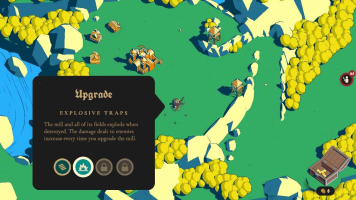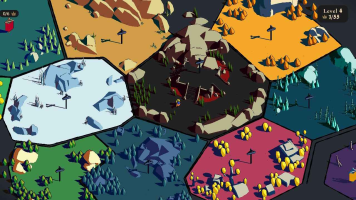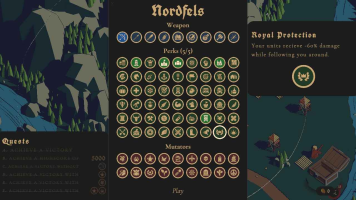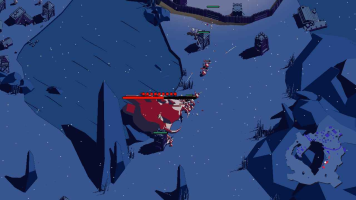General Information
While Thronefall boasts stunning visuals, the minimalist art style sometimes makes it challenging to distinguish enemy types and their combat interactions. This can prove particularly problematic, even without additional difficulty modifiers activated. The simplified aesthetic, while appealing, occasionally hampers clear combat feedback.
The soundtrack, though limited, serves its purpose effectively. Given Grizzly Games' small development team, the ambient daytime nature sounds transitioning to intense nighttime string arrangements work well. However, the limited number of tracks becomes noticeable through repeated plays across different areas, and additional musical variety would have been welcome.
Thronefall's gameplay stands as its primary attraction. Players can craft unique experiences through nine weapon choices, fifty-four perks (with five slots available), and eighteen mutators, allowing for customized difficulty levels and playstyles, including bonus modes unlocked after completing the main ten-stage campaign. However, my journey wasn't consistently enjoyable. The optional stage challenges initially appear reasonable but gradually reveal themselves as deceptively difficult (pro tip: when bonus XP rewards exceed 50%, prepare for a significant challenge).
A clearer difficulty rating system for quests, rather than a simple alphabetical listing, would have significantly reduced player frustration. While quests remain optional content, they provide valuable goals for players who efficiently progress through the main content.
Initially, I found success with a specialized monarch build focused on commanding abilities, accepting a 60% reduction in personal damage while boosting units and towers by 40%. This strategy served me well until reaching Sturmklamm's 'E' Quest. At this point, the game transformed into an exercise in frustration. Despite the apparent variety in weapons, perks, and mutators, many combinations proved ineffective in securing victory. Even without additional mutators, which substantially increase difficulty, later bosses, particularly the final encounter, seemed nearly impervious to damage.
As someone experienced with tower defence games, I noticed the absence of several genre staples that typically help manage difficulty and frustration. Traditional tower defence games often allow players to construct elaborate mazes or obstacle courses that enemies must navigate before reaching the central objective. Many also feature diverse tower types with specialized functions, such as applying slowing effects, poison damage, percentage-based damage, or freezing abilities. In Thronefall, players typically gravitate toward a specific castle centre upgrade path that enables damage reflection and initial damage equal to 25% of enemy health. This optimization unfortunately invalidates many other strategic options and diminishes experimental gameplay. Speaking from personal experience, when the optimal strategy involves repeatedly dying while acting as a damage sponge, the game loses its appeal.
While such restrictive meta strategies might be acceptable for achievement hunting or optional challenges, their necessity for basic game completion is problematic. A recent survey I conducted among fighting game enthusiasts revealed that player expression ranks highly in gaming preferences. Having access to only one viable build strategy feels similar to discovering your favorite fighting game character or carefully crafted RPG build cannot progress to the game's conclusion - a genuinely disappointing realization.
The game also features an endless mode and post-completion bonus challenges that restrict players to specific predetermined builds. However, after the grueling experience of completing the main campaign through careful, incremental progress, I found myself reluctant to engage with additional Thronefall content.
Thronefall's commitment to minimalism in its tower defence design ultimately becomes its weakness. While issues like limited strategic options and indistinct enemy designs could potentially be addressed, introducing additional musical variety, gameplay options, or variables would contradict the game's minimalist philosophy. As the saying goes, beauty - or in this case, game design - is subjective.





